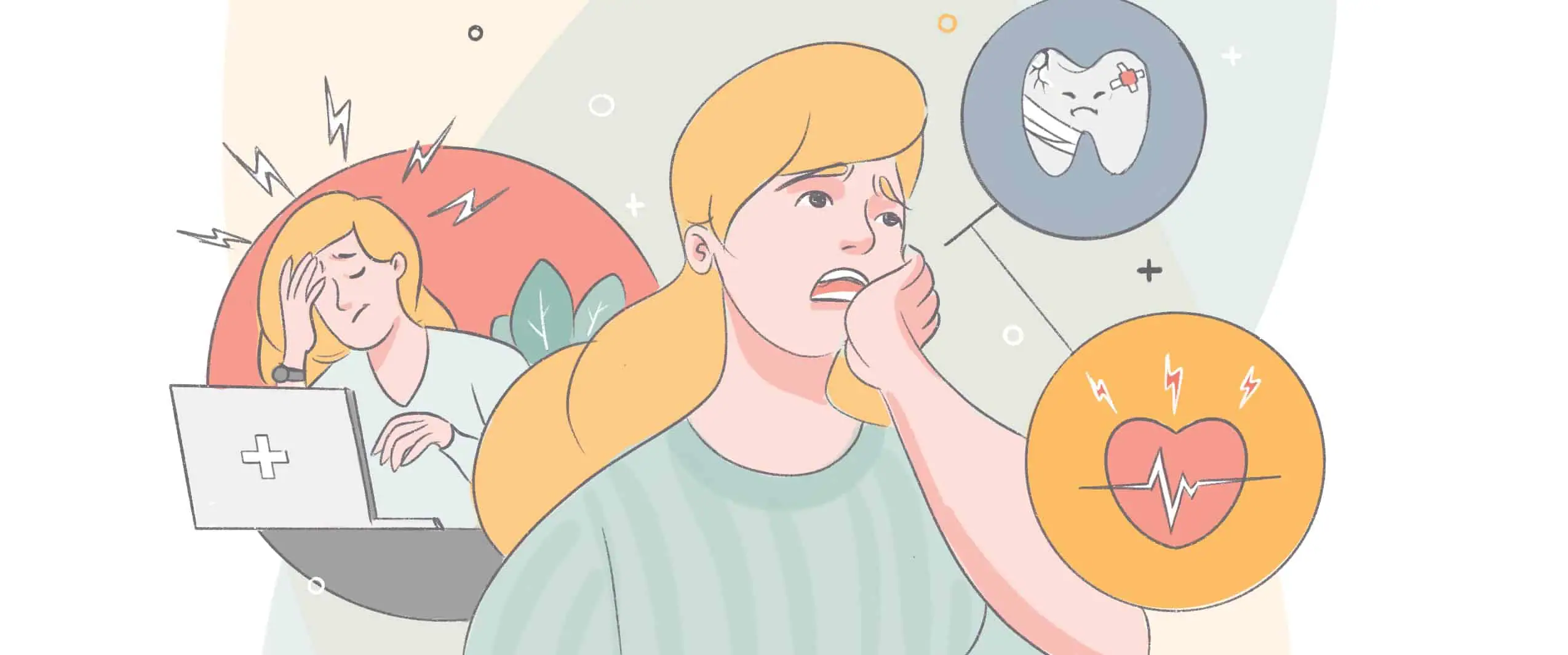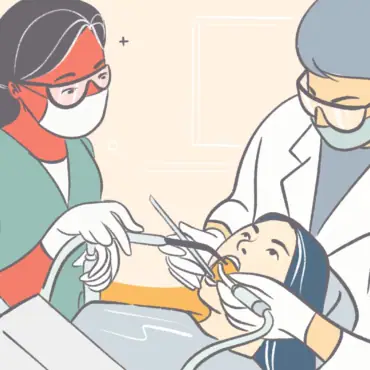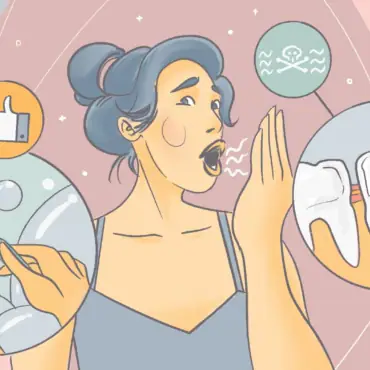Cat got your tongue? Or is it just that your jaw joint hurts so much you aren’t feeling very chatty?
Approximately 12% of people in the US are dealing with temporomandibular joint disorders at any one time. That mouthful of a term refers to the joint that makes it possible for you to eat, drink, and speak. Thankfully, most problems with this joint are temporary, but that may be only a small comfort when you’re in the midst of the problem.
What is TMJ?
Have you ever seen one of those singing and dancing skeletons at Halloween? Then you’ve already seen the temporomandibular joint (TMJ) in action. We all have two of these joints, one on either side of the head. They are located where the mandible (jawbone) meets the temporal bones of the skull, which are located around and in front of your ears. This is where that ridiculously long name comes from.
It is a synovial joint, which means that it has synovial fluid to cushion movement. It is also a double joint, which means there are two separate synovial cavities.
The TMJ allows for movement side-to-side, forward and back, as well as hinging up and down.
What are the symptoms of TMJ disorders?
People with TMJ disorders (TMD) may experience a number of symptoms including:
- Jaw or jaw muscle tenderness
- Jaw stiffness, especially in the morning
- Jaw pain when eating or yawning
- Earache
- Facial pain
- Trouble opening and closing the mouth
- Inflammation around the joint
- Distinct clicking or popping noises when opening and closing the mouth
- Headaches
- Neckaches
- Toothaches or sensitive teeth with no other apparent causes
- Restricted joint movement or locking of the jaw
What causes TMJ disorders?
Women of child-bearing age are more than twice as likely to be affected by TMJ disorders. It is believed that higher levels of the hormones estrogen and progesterone cause ligament laxity (more play in the joint) which can contribute to TMJ pain.
Of course, that’s not all that can cause or contribute to TMD.
Arthritis
As an autoimmune disorder that causes your body to attack its own joints, rheumatoid arthritis can be the root cause of your TMJ pain. In a study of people with rheumatoid arthritis, nearly 93% of them were found to have problems with the TMJ.
Degenerative osteoarthritis can affect any joint in the body, including the TMJ.
About 30% of people with psoriasis can develop psoriatic arthritis, a chronic inflammatory joint condition that can also affect the TMJ.
Dislocation or injury
Have you recently sustained a blow to the jaw or undergone extensive dental work? An injury such as a blow or excessive stretching can put too much strain on the joint and cause problems.
Still need answers?
Book with a top-rated dentist in your city to get the treatment you need.
Repetitive motion
Do you have a habit of biting your nails? Chewing gum frequently? Clenching or grinding your teeth? Some people unknowingly suffer from bruxism (nighttime tooth grinding). All of these can put undue stress on your TMJ and lead to issues.
Jaw misalignment
People with jaw misalignment issues often suffer from TMD. The inherent structure of the jaw is incorrect and since it doesn’t fit together well, it can cause pain. Find a dentist to help fix these issues and ease symptoms
Connective tissue diseases
Problems with the connective tissue can result in a jaw that is too loose or that is being pulled out of alignment. Any of these issues can result in TMJ pain.
Stress
Stress and anxiety can affect nearly every part and system of the body so we can’t leave out the jaw. Facial and neck tension, along with clenching the jaw can lead to jaw pain.
Medications
TMJ can also be a side effect of various prescription medications. These include oral contraceptives, antipsychotics, and antidepressants.
How are TMJ disorders diagnosed?
If you are experiencing TMJ symptoms, the first step is to visit your doctor or dentist. Discuss your symptoms with your healthcare professional and be sure to mention any other conditions, such as arthritis, that you may have.
During the exam, your healthcare professional will examine your jaw and observe your range of motion. They will also listen closely and feel the joints as you open and close your mouth.
Still need answers?
Book with a top-rated dentist in your city to get the treatment you need.
At this point, if they suspect a problem, they may order tests to take a more thorough look. Dental x-rays can be used to examine the bones and teeth. For more detailed images of the bones, your doctor may order a CT scan. To take a closer look at the soft tissue of the joint, an MRI may be necessary.
Do TMJ disorders go away?
Symptoms of TMJ can come and go, prompting some people to just ignore the symptoms when they are present and be thankful when they go away. TMJ is also highly treatable with home remedies such as hot or ice packs, exercises, and relaxation techniques. Mild over-the-counter pain relievers can also be a quick way to dull the pain and go on about your way.
There is some debate among experts as to whether TMJ can actually go away on its own. For most people, it depends on what the base cause is of their discomfort.
However, nearly everyone will benefit from treatment. TMJ is usually very responsive to various treatment options so there really is no reason not to seek out TMJ pain relief.
Can a dentist help with TMJ?
If you are suffering from TMJ pain and have a dentist appointment coming up, be sure to mention it to your dentist. They can help in diagnosing your condition and if the underlying cause is dental in nature, may be able to help treat it.
Due for a checkup?
Find a top rated dentist near you that takes your insurance.
If your TMJ issues are caused by a medical condition, they will likely refer you to a medical doctor for specialized medical advice. From there, your doctor will determine the best course of action based on your CT scan or MRI.
Are TMJ disorders covered by dental or medical insurance?
Worried about paying for TMJ diagnosis and treatment? Don’t be. Most of the time, TMJ is covered by insurance. The only issue that arises is which insurance will cover it. There is sometimes debate about whether your dental or medical insurance will cover it.
In most cases, medical insurance covers TMJ treatments. The reasoning behind this is that a joint is a joint no matter where it is located in the body.
When should I see a dentist about TMJ?
If you are experiencing any of the symptoms of TMJ, don’t hesitate to seek help. If you think your problems are due to a dental issue rather than one of the other causes we’ve talked about, visiting a dentist may be the best first stop.
Dentists can help with TMJ when it is caused by jaw misalignment or issues like jaw clenching and bruxism. They can put braces on your chompers to fix alignment problems or craft an oral appliance, often called a splint or a bite plate, that will inhibit your upper teeth from grinding against your lower teeth.
Other treatments for TMJ include medications such as muscle relaxants and anti-inflammatory medication.
Looking for a new dentist?
Tired of putting up with TMJ symptoms? Hopefully, we’ve helped you see that treatments for TMJ disorders aren’t anything too scary and can really improve your quality of life.
Need to find a dentist near you to get started? Let us help! Our mission is to connect you with dental professionals who put your oral health and wellness first. Dental care is vital to your quality of life. Level up your oral health and wellness today!








